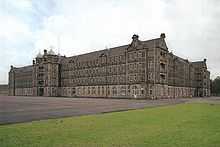Redford Barracks
| Redford Barracks | |
|---|---|
| Colinton, Edinburgh, Scotland | |
|
The former Cavalry Barracks at Redford, now base to 51st (Scottish) Brigade's Regional Training Centre | |
 Redford Barracks | |
| Coordinates | 55°54′37″N 3°14′45″W / 55.91028°N 3.24583°WCoordinates: 55°54′37″N 3°14′45″W / 55.91028°N 3.24583°W |
| Site information | |
| Owner | Ministry of Defence |
| Operator |
|
| Site history | |
| Built | 1909–1915 |
| Built for | War Office |
| Architect | Harry Bell Measures |
| In use | 1915-Present |
| Garrison information | |
| Occupants | 3rd Battalion, The Rifles |
Redford Cavalry and Infantry Barracks is located on Colinton Road, near the Edinburgh City Bypass, east of the suburb of Colinton in Edinburgh, Scotland.
Redford Barracks was built between 1909 and 1915 by the War Office and designed by Harry Bell Measures. When completed, the Barracks was the largest military installation built in Scotland since Fort George in the Highlands. The British Army garrison in Edinburgh Castle formally moved out to the barracks in 1923. Today, the Infantry Barracks are the location of a resident line infantry battalion, 3rd Battalion, The Rifles, and the Cavalry Barracks houses a number of administrative functions.
The barracks comprises two category B listed main buildings and parade squares facing Colinton Road.[1][2]
Infantry Barracks
The Infantry Barracks (55°54′37″N 3°14′45″W / 55.9103°N 3.2457°W), was originally built to house an entire infantry regiment and could accommodate 1,000 men. Today it provides everything the resident line infantry battalion requires to function. The families live in service quarters close to the barracks and the children attend local schools. The main barrack block itself houses the resident Battalion Headquarters, one Rifle Company, a Fire Support Company and Headquarters Company. The two other Rifle Companies are accommodated in a separate, newer block.
Redford provides the base for the guard of Edinburgh Castle. The resident Infantry Battalion has been the 3rd Battalion, The Rifles (formerly 2nd Battalion, The Light Infantry) since 2003, when they took over from the Argyll and Sutherland Highlanders.
Cavalry Barracks
The three-storey Cavalry Barracks (55°54′46″N 3°14′31″W / 55.9127°N 3.2419°W), with its tall domed clock-tower, was originally built to house a cavalry regiment, most notably the Royal Scots Greys, with a large annexe of stables and associated outbuildings. With the permanent stationing of armoured units like the Royal Scots Dragoon Guards in Germany as part of the British Army of the Rhine, the Cavalry Barracks became a home to D squadron, Royal Scots Dragoon Guards stationed there from 1972 until disbanded in 1976. Today it is 51st (Scottish) Brigade's Regional Training Centre, base for all Territorial Army training in Scotland, as well as housing other administrative functions. The Cavalry Barracks has also recently become base to the Headquarters of 52 Brigade, which largely moved from Edinburgh Castle, with the exception of a few remaining ceremonial functions. The Cavalry Barracks houses the performers of the annual Edinburgh Military Tattoo, with the parade square used for rehearsals.

Nearby locations
The Royal Scots Borderers, 1st Battalion, Royal Regiment of Scotland and The Band of the Royal Regiment of Scotland are located at the nearby Dreghorn Barracks, which was originally requisitioned by the Army in 1914. Together with the Royal Highland Fusiliers, 2nd Battalion, The Royal Regiment of Scotland, based at Glencorse Barracks in Penicuik, the three sites comprise the City of Edinburgh Garrison.
Drill halls used by 105th Regiment Royal Artillery (Volunteers) and the City of Edinburgh UOTC are located adjacent to the barracks and the Army School of Bagpipe Music and Highland Drumming is situated nearby at Inchdrewer House. The barracks also makes use of the Castlelaw Training Area and Rifle Range in the Pentland Hills. Situated beside both Redford Barracks and Dreghorn Barracks are the family quarters for army personnel. These houses are available only to married soldiers. The houses are rented by the soldiers for a subsidised fee.
The future
Moving towards Future Force 2020, and returning the 20,000 personnel stationed in Germany, means the Armed Forces' estate requirements will change, and the Ministry of Defence reviewed its future basing needs accordingly. It was proposed that by 2020, the Army would be made up of five Multi-Role Brigades (MRB) of around 6,000 people, with one located in Scotland, centred on Edinburgh. In 2011 it was announced that the base at Kirknewton, south-west of Edinburgh, would be developed into a major Army base, with the first units scheduled to move there in 2016-17. Redford and Dreghorn Barracks would become surplus to requirements and were earmarked for disposal under this plan.[3] However, in December 2011 it was reported that the planned move to Kirknewton was in doubt, and that Redford Barracks would be retained.[4] By 2013 it was confirmed that the MRB plan had been dropped, and that only a part of Redford Barracks would be closed.[5]
References
- ↑ "Redford Infantry Barracks:Listed Building Report". Historic Scotland.
- ↑ "Redford Cavalry Barracks:Listed Building Report". Historic Scotland.
- ↑ "Defence Basing Review: Standard Note SN06038". House of Commons Library. 14 November 2011.
- ↑ "Barracks wins reprieve". Edinburgh Evening News. 4 December 2011.
- ↑ "Scottish barracks to close in £240m MoD cutbacks". The Herald. 5 March 2013.
